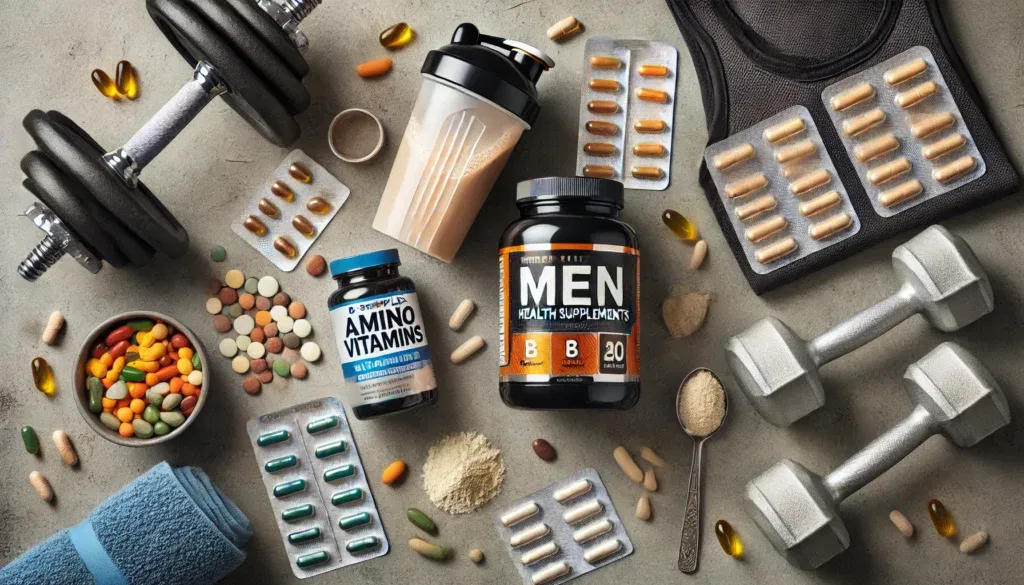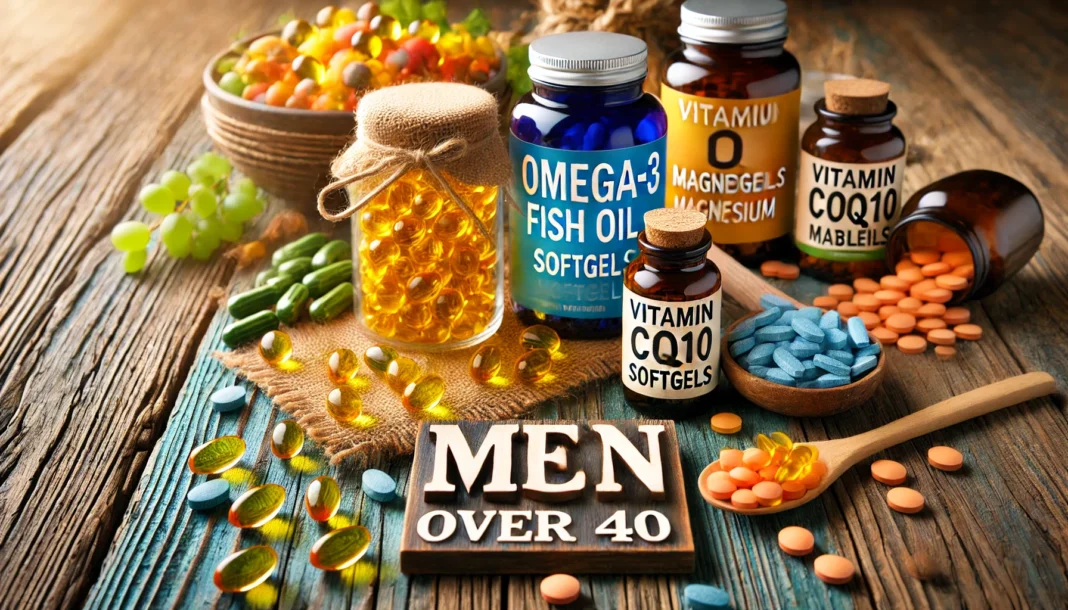As men reach their forties, their nutritional needs shift in response to the natural aging process, lifestyle changes, and evolving health priorities. While a balanced diet remains the foundation of good health, supplementation can fill nutritional gaps and support overall well-being. The best supplements for men over 40 are carefully selected to enhance energy levels, support cardiovascular health, boost cognitive function, and maintain hormonal balance. This article explores the most important nutrients for longevity and vitality, offering insights into their benefits and how to incorporate them into a daily routine.
You may also like: How to Increase Testosterone Levels Naturally: Science-Backed Strategies for Men’s Health & Longevity
The Role of Supplements in Men’s Health After 40
The body’s ability to absorb and utilize nutrients declines with age, making supplementation a key strategy for maintaining health. While diet provides essential vitamins and minerals, many men over 40 experience deficiencies due to metabolic changes, stress, or dietary restrictions. The best male health supplements address these deficiencies, promoting optimal function in key systems such as the heart, brain, and immune system. By selecting the right supplements, men can enhance their quality of life, prevent common age-related diseases, and sustain peak physical and mental performance.
Additionally, modern lifestyles contribute to increased stress, reduced sleep quality, and exposure to environmental toxins, all of which accelerate aging. Supplementation serves as a practical way to counteract these negative influences, providing the body with essential nutrients to maintain resilience. For men in their forties, this means prioritizing supplements that support testosterone levels, muscle preservation, cardiovascular health, and cognitive clarity. The right approach combines high-quality supplements with a healthy diet, exercise, and other lifestyle choices to create a comprehensive wellness plan.

Multivitamins: The Foundation of Daily Nutrition
One of the most common questions is: “Should a 45-year-old man take a daily vitamin?” The answer depends on dietary habits and individual health concerns. A high-quality multivitamin is an excellent foundation for nutritional support, ensuring that essential vitamins and minerals are consumed daily. The best multivitamins for men over 40 include nutrients such as vitamin D, B-complex vitamins, zinc, and magnesium, all of which contribute to energy production, immune function, and metabolic health.
Many men fall short of meeting their daily requirements for key vitamins due to dietary gaps or absorption issues. A multivitamin fills these gaps, providing a broad spectrum of nutrients necessary for cellular function. However, not all multivitamins are created equal. The best male supplements in this category use bioavailable forms of vitamins and minerals, ensuring optimal absorption and effectiveness. Selecting a multivitamin tailored to men’s needs can help prevent deficiencies, support muscle and bone health, and sustain long-term vitality.
Vitamin D: Essential for Bone and Hormonal Health
Vitamin D plays a crucial role in bone health, immune function, and testosterone regulation. Unfortunately, many men over 40 are deficient in this nutrient due to limited sun exposure and dietary intake. The most important vitamins for men include vitamin D because of its ability to strengthen bones, reduce inflammation, and support heart health. Research has also linked adequate vitamin D levels to a lower risk of chronic diseases such as diabetes, cardiovascular conditions, and certain cancers.
Supplementing with vitamin D is particularly important for men who spend most of their time indoors or live in regions with limited sunlight. The recommended dosage varies based on individual needs, but most experts suggest a daily intake of 2,000 to 5,000 IU. Combining vitamin D with vitamin K2 enhances its effectiveness by directing calcium into bones rather than soft tissues, further supporting skeletal integrity. Regular supplementation ensures that men maintain strong bones and a robust immune system while benefiting from improved hormonal balance.
Omega-3 Fatty Acids: Supporting Heart and Brain Health
Omega-3 fatty acids are among the best health supplements for men, offering powerful benefits for cardiovascular and cognitive function. These essential fats, found in fish oil and certain plant sources, help reduce inflammation, lower triglycerides, and support brain health. Regular intake of omega-3s is associated with a reduced risk of heart disease, improved memory, and enhanced mood stability.
Many men do not consume enough omega-3s through diet alone, making supplementation necessary. High-quality fish oil or krill oil supplements provide concentrated doses of EPA and DHA, the two most beneficial forms of omega-3s. In addition to cardiovascular benefits, omega-3s help maintain joint flexibility, reduce muscle soreness, and enhance cognitive performance. For men over 40, incorporating omega-3 supplements into their routine can contribute to longevity and overall well-being.
Magnesium: A Critical Mineral for Stress and Muscle Health
Magnesium is one of the most overlooked but necessary vitamins for men. It plays a crucial role in over 300 enzymatic reactions in the body, influencing everything from muscle function to stress management. Magnesium deficiency is common in men over 40 due to factors such as high stress levels, poor dietary intake, and decreased absorption with age.
This mineral is particularly important for cardiovascular health, as it helps regulate blood pressure and supports proper muscle contraction, including that of the heart. Additionally, magnesium promotes relaxation and improves sleep quality, making it a valuable supplement for those experiencing stress or insomnia. The best food supplements for men in this category include magnesium citrate, glycinate, or malate, all of which offer superior bioavailability and effectiveness.
Zinc: Boosting Immunity and Testosterone Levels
Zinc is one of the best male supplements for maintaining immune function, promoting wound healing, and supporting healthy testosterone levels. As men age, testosterone production naturally declines, leading to reduced energy, muscle mass, and libido. Zinc plays a direct role in hormone regulation, making it an essential supplement for men over 40.
Dietary sources of zinc include red meat, shellfish, and seeds, but supplementation ensures consistent intake. A daily dose of 10 to 30 mg of zinc helps prevent deficiency and supports immune resilience. Pairing zinc with copper in a balanced ratio prevents potential imbalances, as excessive zinc can interfere with copper absorption. Regular zinc supplementation provides immune protection while contributing to optimal hormonal health, reinforcing its status as a must-take supplement.
Coenzyme Q10 (CoQ10): Enhancing Cellular Energy Production
Coenzyme Q10 is a powerful antioxidant that supports heart health and energy production at the cellular level. It is one of the best daily supplements for men, particularly those concerned with cardiovascular health and aging. CoQ10 levels decline with age, reducing the body’s ability to generate energy efficiently. Supplementing with CoQ10 enhances mitochondrial function, improves circulation, and helps manage blood pressure.
For men taking statins to lower cholesterol, CoQ10 is especially beneficial, as statin medications deplete the body’s natural stores of this vital nutrient. CoQ10 supplementation restores energy levels, reduces muscle pain associated with statins, and promotes overall vitality. The best health supplement for men looking to sustain long-term heart health and endurance, CoQ10 provides extensive benefits that support both physical and cognitive performance.

Frequently Asked Questions (FAQ) on Men’s Health Supplements
1. What are the best male health supplements to support overall well-being?
The best male health supplements should provide essential nutrients that support energy, immune function, heart health, and cognitive performance. Key supplements include omega-3 fatty acids for cardiovascular health, magnesium for muscle function and relaxation, and vitamin D for bone strength and immune support. Additionally, probiotics play a crucial role in gut health, which impacts digestion and nutrient absorption. Adaptogens like ashwagandha help manage stress and support hormone balance. When choosing the best male supplements, consider your lifestyle, diet, and specific health needs.
2. What vitamin supplements should I take daily for optimal health?
Daily supplements for men should include a well-balanced combination of vitamins and minerals to fill nutritional gaps. Vitamin C and zinc are essential for immune function, while B-complex vitamins support energy production and cognitive health. Antioxidants like vitamin E and selenium protect against oxidative stress, which can accelerate aging. If you have dietary restrictions, a high-quality multivitamin can help ensure you meet your daily nutritional requirements. To determine what supplements you should be taking daily, consider consulting a healthcare professional to address any deficiencies.
3. Should a 45-year-old man take a daily vitamin?
As men age, their nutritional needs evolve, making it beneficial to take a daily vitamin. After 40, testosterone levels gradually decline, so supplements like zinc and vitamin D become even more important. Calcium and magnesium support bone health, which is vital for preventing osteoporosis. B vitamins aid in maintaining energy levels and cognitive function, helping to combat age-related decline. The best supplements for men over 40 should also include CoQ10 for heart health and omega-3s for joint and brain function. Incorporating these into your routine can support long-term wellness and vitality.
4. What are the best supplements for men looking to improve their energy levels?
Men experiencing fatigue may benefit from supplements that support energy production and metabolic function. B-complex vitamins help convert food into energy, while iron prevents anemia-related fatigue. Adaptogens like rhodiola rosea and ginseng can enhance endurance and mental clarity. L-carnitine plays a role in cellular energy production, particularly for those engaging in regular physical activity. The best daily supplements for men looking to maintain high energy levels should also include magnesium, as it supports muscle function and relaxation, reducing overall fatigue.
5. What are the most important vitamins for men to maintain muscle health?
For men focused on muscle health, essential supplements include protein powders, branched-chain amino acids (BCAAs), and vitamin D. Magnesium aids muscle relaxation and reduces cramps, while creatine enhances strength and performance. Collagen supports connective tissues and joint health, preventing injuries. To optimize recovery and muscle maintenance, men should consider adding the best supplements for men over 40, such as CoQ10 and fish oil, which help with inflammation and cardiovascular health. Proper supplementation, combined with resistance training and adequate protein intake, ensures long-term muscle support.
6. What is the best food supplement for men with an active lifestyle?
Active men require food supplements that replenish nutrients lost during exercise and enhance recovery. Protein powders provide amino acids necessary for muscle repair, while electrolytes help maintain hydration. Supergreens powders offer antioxidants and micronutrients that may be missing from a regular diet. Nitric oxide boosters like beetroot extract enhance blood flow and oxygen delivery, improving endurance. The best male health supplements for an active lifestyle should also include omega-3 fatty acids to support joint health and reduce inflammation from intense workouts.
7. What are the top supplements for men to support cognitive function?
Cognitive function is crucial for maintaining focus, memory, and mental clarity. The best supplements for men looking to support brain health include omega-3 fatty acids, which reduce brain inflammation and enhance cognitive performance. Nootropics like lion’s mane mushroom and phosphatidylserine promote neural plasticity and memory retention. B-complex vitamins aid in neurotransmitter function, while magnesium supports stress management and relaxation. Regular intake of these nutrients, alongside a healthy diet and mental stimulation, ensures long-term cognitive support.
8. What are the best supplements for men over 40 to maintain testosterone levels?
After 40, testosterone levels naturally decline, affecting energy, muscle mass, and libido. Zinc and vitamin D are among the best male supplements for hormonal balance, as they support testosterone production. Ashwagandha has been shown to reduce cortisol levels, which can help optimize testosterone levels. D-aspartic acid and fenugreek extract are also known to boost natural testosterone production. If you’re looking for the best supplement for guys over 40, consider a combination of these nutrients along with strength training and adequate protein intake to maximize results.
9. What supplements should I take daily to promote heart health?
A heart-healthy supplement regimen includes omega-3 fatty acids, which reduce inflammation and support circulation. Coenzyme Q10 (CoQ10) is essential for cardiovascular function and energy production in heart cells. Magnesium aids in regulating blood pressure and improving vascular health. The best vitamins to take for men’s heart health should also include vitamin K2, which directs calcium to bones instead of arteries. Adopting a heart-friendly diet alongside these supplements can significantly improve cardiovascular well-being.
10. What are the must-take supplements for men aiming for longevity and overall vitality?
To support longevity, men should focus on anti-inflammatory and antioxidant-rich supplements. Curcumin, the active compound in turmeric, reduces chronic inflammation linked to aging. Resveratrol, found in red wine and grapes, supports heart health and cellular function. The best daily supplements for men aiming for long-term health include vitamin D, omega-3s, and magnesium. Probiotics also play a crucial role in maintaining gut health, which is essential for immune function and nutrient absorption. Taking a comprehensive approach to supplementation, combined with a balanced diet and regular exercise, ensures lasting vitality and optimal health.

Conclusion: A Holistic Approach to Men’s Health Over 40
Selecting the best supplements for men over 40 requires a strategic approach that addresses key aspects of aging, including hormonal balance, cardiovascular health, and cognitive function. Essential nutrients such as vitamin D, omega-3 fatty acids, magnesium, zinc, and CoQ10 play crucial roles in sustaining vitality and preventing common age-related conditions. By incorporating these supplements into a well-rounded lifestyle, men can enhance their energy levels, maintain muscle mass, and support overall longevity.
While supplements offer valuable benefits, they should complement rather than replace a nutrient-dense diet, regular exercise, and healthy sleep habits. Understanding what vitamin supplements men should take daily ensures that nutritional needs are met while optimizing well-being. By making informed choices, men over 40 can continue to thrive, maintaining peak health and vitality for years to come.
men’s supplement guide, longevity nutrition, male wellness supplements, best vitamins for aging men, essential nutrients for men, optimal health supplements, testosterone support vitamins, heart health supplements, brain-boosting nutrients, energy-boosting vitamins, muscle recovery supplements, immune system boosters, anti-aging vitamins, best natural supplements for men, healthy aging supplements, daily wellness for men, metabolism-boosting nutrients, stress management supplements, hormone balance for men, nutritional support for men over 40
Further Reading:
Best Supplements For Men Over 40 Part 2: Science-Backed Essentials!
What Vitamins and Supplements for Men Actually Work?
Best Supplements for Men Over 40
Disclaimer: The information provided in this article is for general informational purposes only. The content does not constitute professional advice of any kind, including but not limited to medical, legal, or financial advice. HisHealthMag and its contributors make no representations or warranties regarding the accuracy, completeness, or reliability of the information presented. Always seek the advice of a qualified professional for any specific concerns or questions you may have. Neither HisHealthMag nor its authors assume any responsibility or liability for any actions taken based on the information provided in this article. The views and opinions expressed are those of the author(s) and do not necessarily reflect the official policy or position of HisHealthMag.





